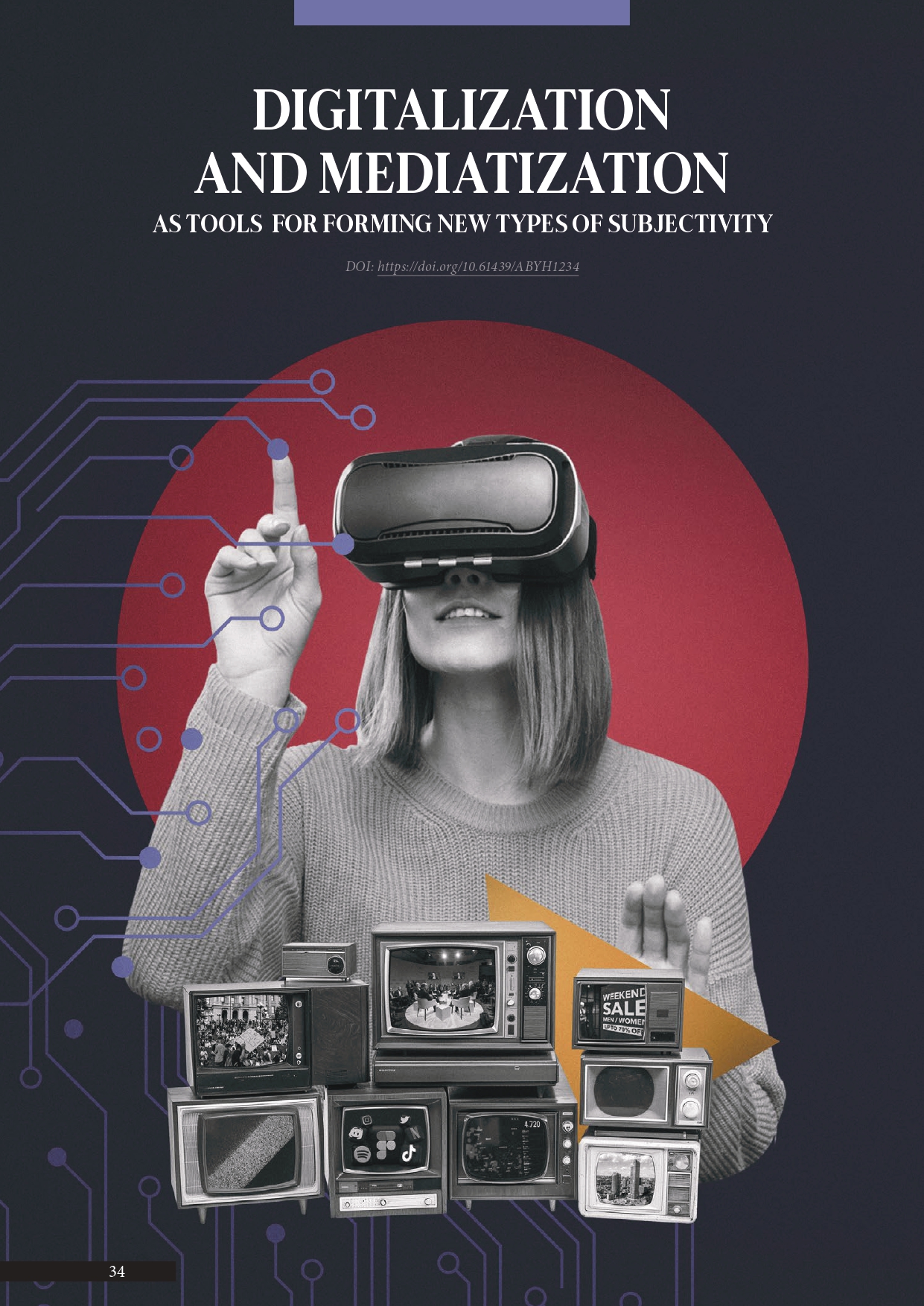Digitalization and mediatization as tools for forming new types of subjectivity
##plugins.themes.academic_pro.article.main##
Abstract
The article explores the latest opportunities for refined control over individuals by power structures within the so-called surveillance capitalism of contemporary society. It highlights the use of advanced tools of digitalization and mediatization, as well as the formation of new types of subjectivity. It identifies the mechanisms through which modern power relations in a control society (domination and coercion of individuals) emerge, differing significantly from traditional forms of governance and control in pre-modern and early modern European societies. The discussion is based on Michel Foucault’s concept of socio-historical types of power relations in societies, including sovereign power, disciplinary society, and control society in its current digital form.
The paper analyzes the history of concepts such as biopower, biopolitics, and biomass introduced by Foucault, starting with his studies of disciplinary society. It demonstrates that biopower, aimed at managing masses and controlling individuals, implemented mechanisms during the disciplinary society that have evolved further in today’s control society through digitalization and mediatization. Its essence involves transforming people into civilian individuals with formal democratic rights and freedoms while simultaneously maintaining the totalization of the population as biomass.
The state is shown to simultaneously undertake the functions of totalization and individualization in the formation of modern subjectivity, from which individuals attempt to escape through nomadic practices and techniques of freedom that guarantee authentic subjectivation.
It argues that with the extensive use of the socio-philosophical doctrine of neo-behaviorism, the formation of representations and behaviors of individuals is justified at all levels of their life activities. This creates conditions for the emergence of new types of subjectivity that fully satisfy neo-globalists. As a result of this long-term process of modern biopolitics, not only has the role of democratic institutions in contemporary society diminished, but neoliberalism could become the "breeding ground" for digital totalitarian regimes of governance and control.
DOI: https://doi.org/10.61439/ABYH1234
##plugins.themes.academic_pro.article.details##
References
Agamben, G. (2002). Remnants of Auschwitz: The witness and the archive. Zone Books.
Agamben, G. (2021). Where are we now? The epidemic as politics. Rowman & Littlefield Publishers.
Alemán, J. (2023). Lacan and capitalist discourse: Neoliberalism and ideology. Routledge.
Braidotti, R. (2013). The posthuman. Polity Press.
Berardi, F. (2007). The soul at work: From alienation to autonomy. Semiotext(e).
Butler, J. (1997). The psychic life of power: Theories in subjection. Stanford University Press.
Butler, J. (2005). Giving an account of oneself. Fordham University Press.
Byung-Chul, H. (2011). Topologie der Gewalt. Matthes & Seitz Berlin.
Byung-Chul, H. (2015). The burnout society. Stanford Briefs.
Byung-Chul, H. (2017). The agony of eros. The MIT Press.
Byung-Chul, H. (2023). Die Krise der Narration. Matthes & Seitz Berlin.
Carpentier, N. (2017). The discursive-material knot: Cyprus in conflict and community media participation. Peter Lang.
Debord, G. (1996). La société du spectacle. Gallimard.
DeLanda, M. (2006). A new philosophy of society: Assemblage theory and social complexity. Continuum.
Deleuze, G. (1997). Negotiations, 1972–1990. Columbia University Press.
Eco, U. (1997). Cinque scritti morali [Five Moral Essays]. Bompiani.
Ferrando, F. (2019). Philosophical posthumanism (Theory in the new humanities). Bloomsbury Academic.
Fisher, M. (2009). Capitalist realism: Is there no alternative? Zero Books.
Foucault, M. (1997). Il faut défendre la société: Cours au Collège de France (1975–1976). Gallimard; Seuil.
Foucault, M. (2004a). Sécurité, territoire, population: Cours au Collège de France (1977–1978). Gallimard; Seuil.
Foucault, M. (2004b). La naissance de la biopolitique: Cours au Collège de France (1978–1979). Gallimard; Seuil.
Fukuyama, F. (2018). Identity: The demand for dignity and the politics of resentment. Farrar, Straus and Giroux.
Fukuyama, F. (2022). Liberalism and its discontents. Profile Books Ltd.
Fuller, S. (2018). Post-truth: Knowledge as a power game. Anthem Press.
Goffman, E. (2007). Asylums: Essays on the social situation of mental patients and other inmates. Routledge.
Gergen, K. J. (1994). Realities and relationships: Soundings in social construction. Harvard University Press.
Newman, S. (2015). Postanarchism. Polity Press.
Palahuta, V. I. (2023). The identity of the modern human as a problem of social and humanitarian knowledge. Newsletter on the Results of Scholarly Work in Sociology, Criminology, Philosophy and Political Science, 4(2), 94–103. https://doi.org/10.61439/SHND1344
Pentland, A. (2015). Social physics: How social networks can make us smarter. Penguin Books.
Skinner, B. F. (2002). Beyond freedom and dignity. Hackett Publishing Company, Inc.
Žižek, S. (1989). The sublime object of ideology. Verso.
Žižek, S. (2020). Hegel in a wired brain. Bloomsbury Academic.
Žižek, S. (2022). Heaven in disorder. OR Books.
Zuboff, S. (2019). The age of surveillance capitalism: The fight for a human future at the new frontier of power. Public Affairs.

